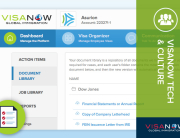Last week, the Senate “Gang of Eight officially released their proposal for comprehensive immigration reform. Immigrants and immigration advocates are already discussing the possibility of a new path to citizenship for undocumented immigrants, but it is important to remember that no new immigration laws have passed yet.
Unfortunately, there are people ready to take advantage of immigrants looking for a path to permanent residency or citizenship. In the Latino community in particular, they operate under names such as “Notario or “Notario Publico” which is not a recognized title in the United States. Sometimes calling themselves “Visa Consultants” “Immigration Consultants” or “Immigration Experts” they use false advertising and fraudulent contracts for services which cannot legally be provided.
Many recent immigrants lack the English language skills and knowledge of U.S. laws to properly protect themselves from immigration fraud, and scammers will use this to their advantage. Immigrants not only may lose a lot of money spent on worthless or fraudulent services, but also they can hurt their chances at pursuing legitimate immigration relief because a notario’s work has damaged their case and their credibility.
How can you tell if you are working with a legitimate lawyer or organization? Here are signs you might be a victim of immigration fraud or “notario fraud:
- They refuse to show their license to practice law in the United States. You have the right to ask to see this license.
- They promise to provide you a visa or service for which you know you are not qualified, such as a green card.
- They promise you a new legal status, visa, or service that does not exist or is not yet approved by the government “ in particular, items proposed in the 2013 immigration reform bill. Don’t trust an immigration service provider if they claim to offer things like RPI (Registered Provisional Immigrant) status, an application for the DREAM Act, a “W visa for low-skilled workers, or a path to citizenship for undocumented immigrants. Hopefully these services will be available to immigrants in the near future, but they currently do not exist.
- They claim to have special connections or influence with government agencies or officials, or claim to have knowledge of secret or unusual immigration laws and loopholes.
- They want to charge you a fee for obtaining U.S. government immigration documents, which are available for free online at USCIS.gov.
- They are holding your original personal documents and asking for a fee to return them to you.
- They ask you to sign blank forms or to sign documents without reading them.
- They ask you to sign documents with any false information on them.
- They refuse to allow you sufficient time to read and understand contracts before signing them and/or refuse to translate documents for you.
Protect yourself from immigration fraud and do your research:
- See if an immigration lawyer or firm is licensed and in good standing by contacting your state bar or state Supreme Court.
- Check online to see if they have been suspended or expelled while practicing immigration law.







